Related Research Articles

Daniel Defoe was an English writer, trader, journalist, pamphleteer and spy. He is most famous for his novel Robinson Crusoe, published in 1719, which is claimed to be second only to the Bible in its number of translations. He has been seen as one of the earliest proponents of the English novel, and helped to popularise the form in Britain with others such as Aphra Behn and Samuel Richardson. Defoe wrote many political tracts and was often in trouble with the authorities, and spent a period in prison. Intellectuals and political leaders paid attention to his fresh ideas and sometimes consulted him.

Robinson Crusoe is a novel by Daniel Defoe, first published on 25 April 1719. The first edition credited the work's protagonist Robinson Crusoe as its author, leading many readers to believe he was a real person and the book a travelogue of true incidents.

Lady Mary Wortley Montagu was an English aristocrat, writer, and poet. Born in 1689, Lady Mary spent her early life in England. In 1712, Lady Mary married Edward Wortley Montagu, who later served as the British ambassador to the Sublime Porte. Lady Mary joined her husband in the Ottoman excursion, where she was to spend the next two years of her life. During her time there, Lady Mary wrote extensively on her experience as a woman in Ottoman Istanbul. After her return to England, Lady Mary devoted her attention to the upbringing of her family before dying of cancer in 1762.
John Robert Moore (1890–1973) was an American biographer and bibliographer of Daniel Defoe.
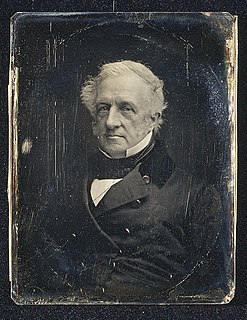
George Peabody was an American financier and philanthropist. He is widely regarded as the father of modern philanthropy.

Jonathan Wild, also spelled Wilde, was a London underworld figure notable for operating on both sides of the law, posing as a public-spirited crimefighter entitled the "Thief-Taker General". Wild simultaneously ran a significant criminal empire, and used his crime fighting role to remove rivals and launder the proceeds of his own crimes.
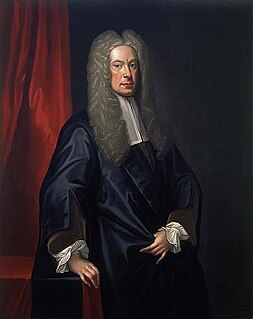
Sir John Clerk of Penicuik, 2nd Baronet (1676–1755) was a Scottish politician, lawyer, judge and composer.

A General History of the Robberies and Murders of the most notorious Pyrates is a 1724 book published in Britain containing biographies of contemporary pirates, which was influential in shaping popular conceptions of pirates. Its author uses the name Captain Charles Johnson, generally considered a pseudonym for one of London's writer-publishers. The prime source for the biographies of many well-known pirates, the book gives an almost mythical status to the more colourful characters, and it is likely that the author used considerable licence in his accounts of pirate conversations. The book also contains the name of the pirate flag the Jolly Roger and shows the skull and bones design.

Elizabeth Singer Rowe was an English poet, essayist and fiction writer called "the ornament of her sex and age" and the "Heavenly Singer". She was among 18th-century England's most widely read authors. She wrote mainly religious poetry, but her best known Friendship in Death (1728) is a series of imaginary letters from the dead to the living. Despite a posthumous reputation as a pious, bereaved recluse, Rowe corresponded widely and was involved in local concerns at Frome in her native Somerset. She remained popular into the 19th century on both sides of the Atlantic and in translation. Though little read today, scholars call her stylistically and thematically radical for her time.
The True-Born Englishman is a satirical poem published in 1701 by English writer Daniel Defoe defending King William III, who was Dutch-born, against xenophobic attacks by his political enemies in England. The poem quickly became a bestseller in England.
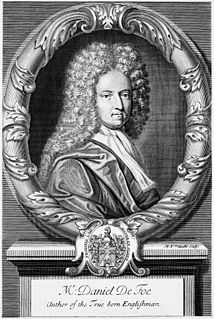
Colonel Jack is a novel by Daniel Defoe, first published in 1722. The considerably longer title under which it was originally published is The History and Remarkable Life of the truly Honourable Col. Jacque, commonly call'd Col. Jack, who was Born a Gentleman, put 'Prentice to a Pick−Pocket, was Six and Twenty Years a Thief, and then Kidnapp'd to Virginia, Came back a Merchant; was Five times married to Four Whores; went into the Wars, behav'd bravely, got Preferment, was made Colonel of a Regiment, came over, and fled with the Chevalier, is still abroad compleating a Life of Wonders, and resolves to dye a General.
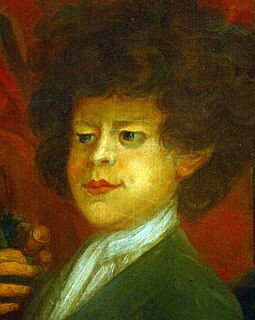
Mere Nature Delineated is a pamphlet by Daniel Defoe, first published in 1726. The longer title under which it was originally published is Mere nature delineated: or, A body without a soul. Being observations upon the young forester lately brought to town from Germany. With suitable applications. Also, a brief dissertation upon the usefulness and necessity of fools, whether political or natural.

Thomas Astley was a bookseller and publisher in London in the 18th century. He ran his business from Saint Paul's Churchyard and Paternoster Row. He belonged to the Company of Stationers. He published the celebrated Voyages and Travels which described localities in Africa and Asia, compiling information from travel books by John Atkins, Jean Barbot, Willem Bosman, Theodor de Bry, Francis Moore, Jean-Baptiste Labat, Godefroi Loyer, Thomas Phillips, William Smith, and Nicolas Villaut de Bellefond. It included engravings by G. Child and Nathaniel Parr. Astley intended his Voyages to improve upon the previous travel collections of Samuel Purchas, John Harris, and Awnsham & John Churchill. It was read by patrons of Hookham's Circulating Library, Boosey's circulating library, London Institution, Royal Institution, Salem Athenaeum, and Cape Town public library. Astley's Voyages was translated into German (Schwabe, Allgemeine Historie der Reisen, Leipzig) and French (Prévost, Histoire des voyages, Paris).
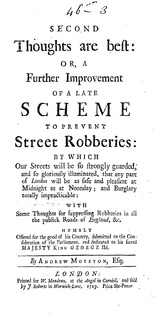
Second Thoughts Are Best: or, a Further Improvement of a Late Scheme to Prevent Street Robberies is a 1729 pamphlet by Daniel Defoe. He wrote it under the name of Andrew Moreton Esq., presented as a dissatisfied middle-class old man extremely concerned about the increase in criminality around the 1720s.
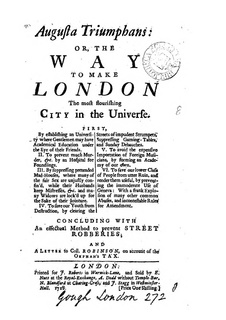
Augusta Triumphans: or, the Way to Make London the Most Flourishing City in the Universe by Daniel Defoe was first published on 16 March 1728. The fictitious speaker of this pamphlet, Andrew Moreton, is a man in his sixties who offers suggestions for the improvement of London. In particular, he fosters the establishment of a university, an academy of music, a hospital for foundlings and licensed institutions for the treatment of mental diseases. Moreover, he encourages the introduction of measures to prevent moral corruption and street robbery.
Andrew Moreton is a pseudonym used by Daniel Defoe in several pamphlets published between 1725 and 1729, proposing some new reflections on themes already discussed in Defoe's 1697 An essay upon projects. Moreton is presented as a crotchety middle-class old gentleman complaining about the indecency of London social life in the latest years. Fulfilling his duty as an honest and concerned citizen, Moreton firmly advances possible reforms in order to improve the quality of life of all social classes. He soon became a controversial figure especially when parts of The Protestant Monastery were reissued in abridged form in other pamphlets such as: Chickens Feed Capons and No Fool like the Old Fool, and also rose protests from a family who believed themselves to have been described in the pamphlet. Moreton became so famous that even A System of Magick was attributed to him in order to boost sales. Defoe was quickly identified in 1725 by his opponents and subjected to personal attacks. Yet, he continued to use Andrew Moreton Esq. as a mask in the following writings.
Parochial Tyranny: Or, the House-Keeper's Complaint Against the Insupportable Exactions, and Partial Assessments of Select Vestries, &C is a 1727 pamphlet by Daniel Defoe. It deals with the corruption of parishes. Similarly to Every-body's Business, Is No-body's Business (1725), The Protestant Monastery (1726), Augusta Triumphans (1728) and Second Thoughts are Best (1729), it was published under the pseudonym of Andrew Moreton. Defoe did not sign his name to the majority of his works. He preferred them to be published anonymously or under one of his pen names. This choice was “sometimes” made “to conceal his authorship or to stimulate sales, but more characteristically to establish a point of view”.
The Protestant Monastery: or, a Complaint against the Brutality of the Present Age is a 1726 pamphlet by Daniel Defoe. It focuses on contemporary disrespect towards elders. Similarly to Every-body's Business, Is No-body's Business (1725), Parochial Tyranny (1727), Augusta Triumphans (1728) and Second Thoughts are Best (1729), it was published under the pseudonym of Andrew Moreton. Defoe did not sign his name to the majority of his works. He preferred them to be published anonymously or under one of his pen names. This choice was “sometimes” made “to conceal his authorship or to stimulate sales, but more characteristically to establish a point of view”.
Everybody's Business is Nobody's Business: Or, Private Abuses, Public Grievances Exemplified is a 1725 pamphlet by Daniel Defoe. It deals with the "exorbitant Wages of our Women, Servants, Footmen". Similarly to The Protestant Monastery (1726), Parochial Tyranny (1727), Augusta Triumphans (1728) and Second Thoughts are Best (1729), it was published under the pseudonym of Andrew Moreton. Defoe did not sign his name to the majority of his works. He preferred them to be published anonymously or under one of his pen names. This choice was “sometimes” made “to conceal his authorship or to stimulate sales, but more characteristically to establish a point of view”.
An Essay Upon Projects (1697) was the first volume published by Daniel Defoe. It begins with a portrait of his time as a "Projecting Age" and subsequently illustrates plans for the economic and social improvement of England, including an early proposal for a national insurance scheme.